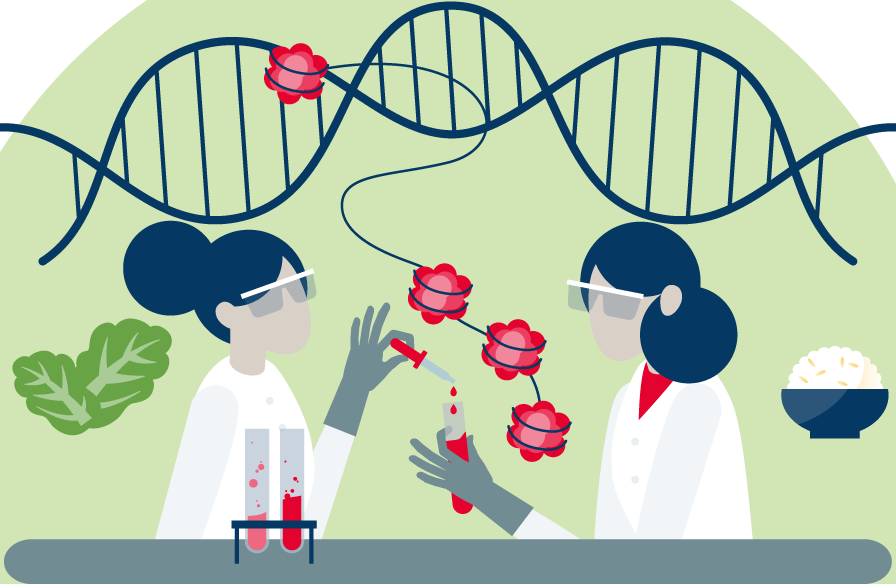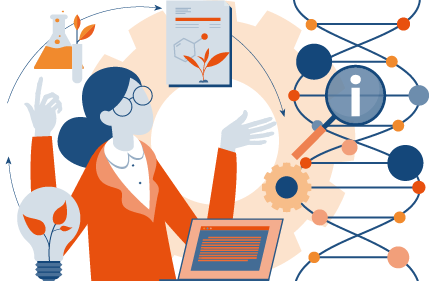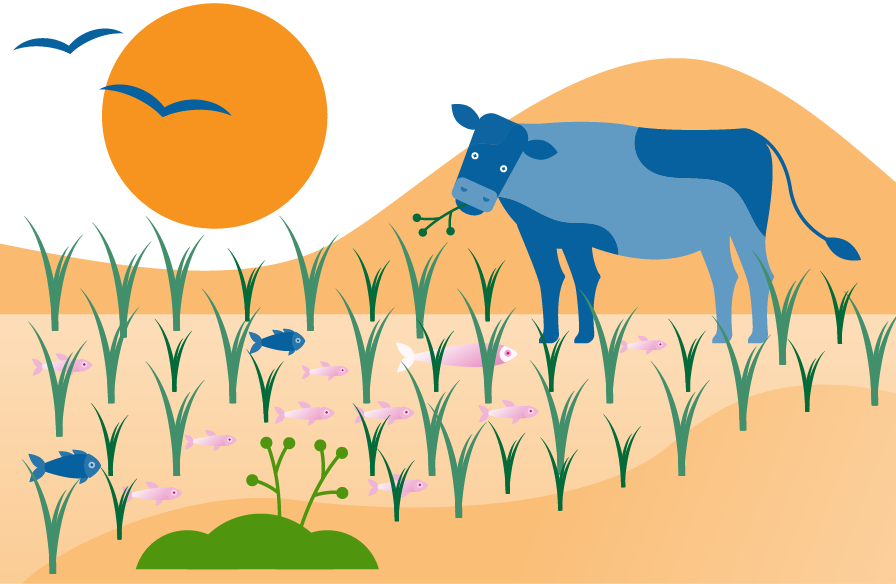Agricultural Biotechnology Seminar Series 2024 – Seminar 1: Genome Editing – Opportunities for Adoption in Addressing Climate Change and Food Security
-

June 4, 2024
7:00 am - 9:00 amVirtual (UTC-5)
Lima, Peru
Currently, agriculture and agroecosystems face numerous challenges due to climate change, including high temperatures, periods of drought, pests, excessive rainfall, and the emergence of new pathogens. Genome editing provides opportunities to simply, quickly, and extremely efficiently alter genetic material and produce organisms with desirable characteristics, such as resistance to pests and pathogens, and greater and better carbon sequestration, among other novel characteristics. Part of the Agricultural Biotechnology Seminar Series, this virtual seminar featured presentations and discussions on various issues related to the use of genome editing technology to address food security challenges resulting from climate change. This project provided a platform for APEC member economies to share resources and knowledge, exchange experiences, and promote the adoption, use, and trade of agricultural biotechnology products.
Agricultural Biotechnology Seminar Series
By bringing together policymakers, risk assessors, and scientists, the series seeks to foster greater participation and enhance engagement in the APEC High Level Policy Dialogue on Agricultural Biotechnology (HLPDAB) outside of the annual meeting.
This seminar’s objectives included:
- Analyze the potential benefits offered by genome editing in agriculture.
- Review advancements in the regulatory systems governing this technology.
- Highlight studies on the application of genome editing with the greatest potential to address the challenges of food security and climate change.

Agenda
7:00 am
Technical Introduction
Dr. Bhavneet Bajaj
Manager – Scientific Programs, Agriculture & Food Systems Institute (AFSI), USA
7:05 am
Welcome and Opening Remarks
Biol. Aura García
Coordinator, High Level Policy Dialogue on Agricultural Biotechnology (HLPDAB)–APEC 2024, Directorate of Genetic Resources and Biotechnology, National Institute of Agrarian Innovation (INIA), Peru
7:15 am
Japan’s Scenery of the Use of Genome Editing in the Context of Climate Change and Food Security
Mr. Yutaka Shimooka
Head, Innovation Strategy Office, Research Policy Planning Division, Agriculture, Forestry and Fisheries Research Council, Ministry of Agriculture, Forestry and Fisheries, Japan
7:30 am
Genome Editing of Crops to Improve Drought Tolerance and Nitrogen-Use-Efficiency
Dr. Ju-Kon Kim
Chief Executive Officer, LaSemilla Inc., Republic of Korea
7:45 am
Advances in Research to Develop New Crop Varieties Capable of More Efficient Photosynthesis and Carbon Utilization
Dr. Liliane Mertz Henning
Research Scientist, Plant Biotechnology Laboratory, Embrapa Soybean, Brazil
8:00 am
Argentina’s Development of Products Derived from Genome Editing Technology and Regulatory Aspects That Facilitate Their Commercialization
Dr. Sergio Feingold
Biotechnology Program Coordinator, National Institute of Agricultural Technology (INTA), Argentina
8:15 am
Moderated Q&A
Dr. Bhavneet Bajaj (moderator)
Manager – Scientific Programs, Agriculture & Food Systems Institute (AFSI), USA
8:45 am
Closing Remarks
Eng. Victoria Esther Rivas Palma
Consultant, Directorate of Genetic Resources and Biotechnology, National Institute of Agrarian Innovation (INIA), Peru
Speakers
Biol. Aura García
Coordinator, High Level Policy Dialogue on Agricultural Biotechnology (HLPDAB)–APEC 2024, Directorate of Genetic Resources and Biotechnology, National Institute of Agrarian Innovation (INIA), Peru
 Aura García is a biologist specializing in plant breeding from La Molina National Agrarian University (UNALM), Peru. She has dedicated her career to studying plant, animal, and microbial genomes. Since 2013, she has been part of the research team at Peru’s National Institute of Agrarian Innovation (INIA), where she has published scientific articles in international journals highlighting the importance of genomics and biodiversity utilization and organized forums and courses aimed at strengthening the capacities of agricultural biotechnology. Her expertise extends to regulatory matters, where she actively participates in the formulation and evaluation of national and international policies related to biological diversity. Currently, she is in charge of the plant pre-breeding area and microbial bank at INIA and coordinates the High-Level Policy Dialogue on Agricultural Biotechnology (HLPDAB) for APEC 2024.
Aura García is a biologist specializing in plant breeding from La Molina National Agrarian University (UNALM), Peru. She has dedicated her career to studying plant, animal, and microbial genomes. Since 2013, she has been part of the research team at Peru’s National Institute of Agrarian Innovation (INIA), where she has published scientific articles in international journals highlighting the importance of genomics and biodiversity utilization and organized forums and courses aimed at strengthening the capacities of agricultural biotechnology. Her expertise extends to regulatory matters, where she actively participates in the formulation and evaluation of national and international policies related to biological diversity. Currently, she is in charge of the plant pre-breeding area and microbial bank at INIA and coordinates the High-Level Policy Dialogue on Agricultural Biotechnology (HLPDAB) for APEC 2024.
Mr. Yutaka Shimooka
Head, Innovation Strategy Office, Research Policy Planning Division, Agriculture, Forestry and Fisheries Research Council, Ministry of Agriculture, Forestry and Fisheries, Japan
 Mr. Yutaka Shimooka heads the Innovation Strategy Office in the Research Policy Planning Division at the Agriculture, Forestry and Fisheries Research Council of Japan’s Ministry of Agriculture, Forestry and Fisheries. He is responsible for creating research innovation strategies for agriculture, forestry, and fisheries, safety assessments for genetically modified organisms on biodiversity, and conducting outreach activities regarding advanced technologies, including genome editing. At this event, he will discuss Japan’s scenery of the use of genome editing in the context of climate change and food security.
Mr. Yutaka Shimooka heads the Innovation Strategy Office in the Research Policy Planning Division at the Agriculture, Forestry and Fisheries Research Council of Japan’s Ministry of Agriculture, Forestry and Fisheries. He is responsible for creating research innovation strategies for agriculture, forestry, and fisheries, safety assessments for genetically modified organisms on biodiversity, and conducting outreach activities regarding advanced technologies, including genome editing. At this event, he will discuss Japan’s scenery of the use of genome editing in the context of climate change and food security.
Dr. Ju-Kon Kim
Chief Executive Officer, LaSemilla Inc., Republic of Korea
 Dr. Ju-Kon Kim is Chief Executive Officer of Lasemilla, Inc., a global agbiotech company. He earned his Ph.D. in Plant Molecular Biology from Cornell University in the USA. He was Dean of the Graduate School of International Agricultural Technology and Head of the Crop Biotechnology Laboratory at Seoul National University. His group is taking a genomics-based approach to improving drought tolerance and nitrogen-use efficiency of crops to fight against global climate change.
Dr. Ju-Kon Kim is Chief Executive Officer of Lasemilla, Inc., a global agbiotech company. He earned his Ph.D. in Plant Molecular Biology from Cornell University in the USA. He was Dean of the Graduate School of International Agricultural Technology and Head of the Crop Biotechnology Laboratory at Seoul National University. His group is taking a genomics-based approach to improving drought tolerance and nitrogen-use efficiency of crops to fight against global climate change.
Dr. Liliane Mertz Henning
Research Scientist, Plant Biotechnology Laboratory, Embrapa Soybean, Brazil
 Dr. Liliane Mertz Henning graduated with an M.S. in Agronomy from the State University of Santa Catarina in 2004 and received a Ph.D. in Seed Science, with a focus in Biotechnology, from the Federal University of Pelotas in 2010. She worked as a Visiting Researcher at the Japan International Research Center for Agricultural Sciences (JIRCAS) until 2013. Since 2013, she has worked as a Research Scientist in the Plant Biotechnology Laboratory at Embrapa Soybean. Her research focuses on the use of CRISPR/Cas to improve the nutritional quality and drought tolerance in soybean.
Dr. Liliane Mertz Henning graduated with an M.S. in Agronomy from the State University of Santa Catarina in 2004 and received a Ph.D. in Seed Science, with a focus in Biotechnology, from the Federal University of Pelotas in 2010. She worked as a Visiting Researcher at the Japan International Research Center for Agricultural Sciences (JIRCAS) until 2013. Since 2013, she has worked as a Research Scientist in the Plant Biotechnology Laboratory at Embrapa Soybean. Her research focuses on the use of CRISPR/Cas to improve the nutritional quality and drought tolerance in soybean.
Dr. Sergio Feingold
Biotechnology Program Coordinator, National Institute of Agricultural Technology (INTA), Argentina
 Dr. Sergio Feingold leads the Agro-Biotechnology Laboratory at the National Institute of Agricultural Technology of Argentina (INTA-Balcarce). He joined INTA as a researcher in 1999 and has coordinated INTA’s Biotechnology Program since 2014. He pioneered the use of molecular markers for breeding in different crops in both public and private institutions in Argentina and participated as Principal Investigator for Argentina in the Potato Genome Sequencing Consortium (www.potatogenome.net; 2006-2011), along with its subsequent work on mapping the potato genome. His research interests are focused on the functional genomics of crops, specifically in allelic variation and characterization of quality genes in native and modern potatoes from the northwest of Argentina, by studying genes related to industrial quality, nutritional value, adaptation to climate change, and secondary metabolite production. The work in his laboratory involves the adaptation and development of tools for new breeding techniques, such as plant genome editing in potatoes and other crops.
Dr. Sergio Feingold leads the Agro-Biotechnology Laboratory at the National Institute of Agricultural Technology of Argentina (INTA-Balcarce). He joined INTA as a researcher in 1999 and has coordinated INTA’s Biotechnology Program since 2014. He pioneered the use of molecular markers for breeding in different crops in both public and private institutions in Argentina and participated as Principal Investigator for Argentina in the Potato Genome Sequencing Consortium (www.potatogenome.net; 2006-2011), along with its subsequent work on mapping the potato genome. His research interests are focused on the functional genomics of crops, specifically in allelic variation and characterization of quality genes in native and modern potatoes from the northwest of Argentina, by studying genes related to industrial quality, nutritional value, adaptation to climate change, and secondary metabolite production. The work in his laboratory involves the adaptation and development of tools for new breeding techniques, such as plant genome editing in potatoes and other crops.
Eng. Victoria Esther Rivas Palma
Consultant, Directorate of Genetic Resources and Biotechnology, National Institute of Agrarian Innovation (INIA), Peru
 Eng. Victoria Rivas is a consultant specializing in biosafety of biotechnology for the Directorate of Genetic Resources and Biotechnology at the National Institute of Agrarian Innovation (INIA), Peru. She has an M.Sc. in Animal Breeding from Edinburgh University, Scotland. Her professional experience includes project management, fieldwork, event organization, research, and teaching. Her areas of expertise include animal genetic resources, agricultural biotechnology, and biosafety. She is currently supporting the technical aspect of the APEC High Level Policy Dialogue on Agricultural Biotechnology (HLPDAB) meeting, which will take place in Trujillo in August 2024.
Eng. Victoria Rivas is a consultant specializing in biosafety of biotechnology for the Directorate of Genetic Resources and Biotechnology at the National Institute of Agrarian Innovation (INIA), Peru. She has an M.Sc. in Animal Breeding from Edinburgh University, Scotland. Her professional experience includes project management, fieldwork, event organization, research, and teaching. Her areas of expertise include animal genetic resources, agricultural biotechnology, and biosafety. She is currently supporting the technical aspect of the APEC High Level Policy Dialogue on Agricultural Biotechnology (HLPDAB) meeting, which will take place in Trujillo in August 2024.
Dr. Bhavneet Bajaj
Manager – Scientific Programs, Agriculture & Food Systems Institute (AFSI), USA
 Dr. Bhavneet Bajaj joined the Agriculture & Food Systems Institute (AFSI) in July 2018 as Scientific Program Manager. She has been involved in projects related to safety assessment of foods and feeds derived from genetically engineered plants and serves as a resource person in providing technical support for capacity building programs in biotechnology. She was also the program lead for USDA-funded technical training for Chinese and Indonesian regulators and manages operations for both the Crop Composition Database and the World Nutrient Databases for Dietary Studies.
Dr. Bhavneet Bajaj joined the Agriculture & Food Systems Institute (AFSI) in July 2018 as Scientific Program Manager. She has been involved in projects related to safety assessment of foods and feeds derived from genetically engineered plants and serves as a resource person in providing technical support for capacity building programs in biotechnology. She was also the program lead for USDA-funded technical training for Chinese and Indonesian regulators and manages operations for both the Crop Composition Database and the World Nutrient Databases for Dietary Studies.
Prior to joining AFSI, Dr. Bajaj was a Visiting Scientist at the Sustainable Agricultural Systems Laboratory, Agricultural Research Service, USDA, where she worked on carotenoid pathway regulation in tomatoes. Before then, she was Associate Investigator with the Plant Protection group at (then) DuPont, where she devised a metabolic engineering strategy for insect control in soybean. While in India, she was an Assistant Professor at Jaipur National University, where she taught genetic engineering, enzymology, and biochemistry courses to M.Sc. level students. Her research work over the past 12 years involved plant secondary metabolites of nutritional, agricultural, and medicinal importance.




